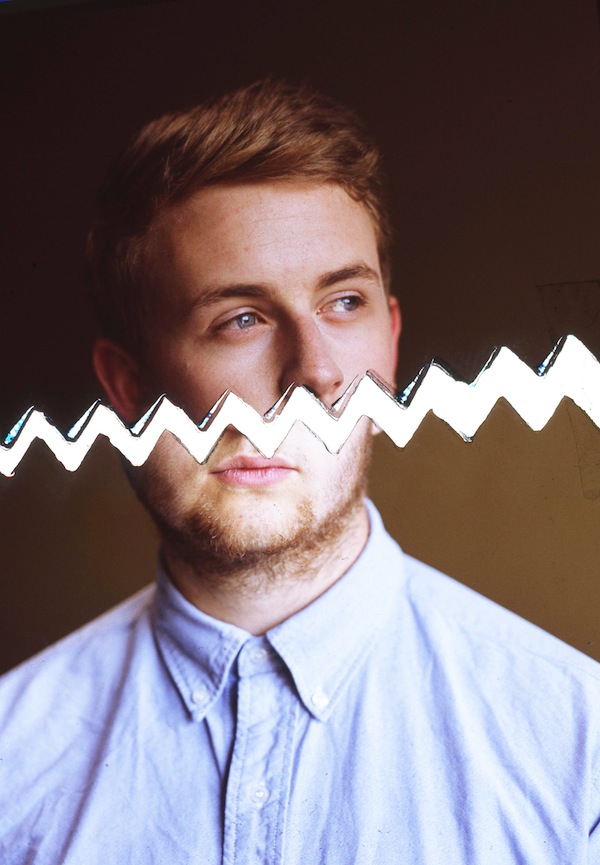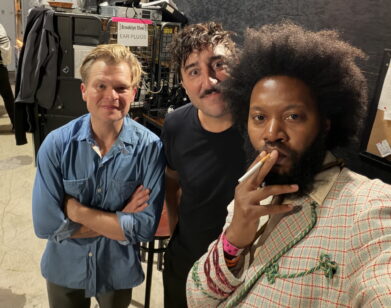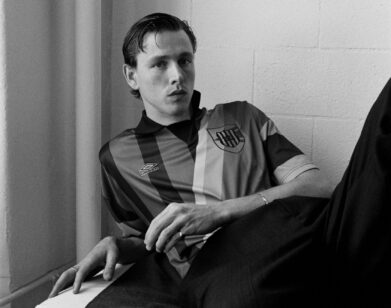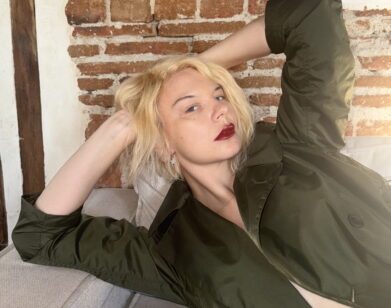Disclosure’s Deep Cuts
PHOTOS BY VITA HEWISON
Guy and Howard Lawrence, the brothers behind Disclosure, are 22 and 19 years old (respectively), were born and raised in suburban Surrey, England, and self-identify very strongly as deep house artists. Since their debut album, Settle, dropped at the beginning of the summer, a lot of debate has centered on whether or not they really should. It’s a genre with roots in the esoteric 1980s Chicago club scene, and it’s having a very big, mainstream moment on international radio, much to the chagrin of its old-school devotees. Disclosure, with four charting singles in the last year, is either house music’s contemporary champion or the nail in its coffin.
There’s a strong argument to be made that they’re the former, but that has everything to do with their breaking from the genre’s conventions. For one, they don’t deny their inclination for pop. “At the end of the day, we wanted to write pop songs for this album,” says Guy. “They’re not necessarily pop music, but they are pop-structured.” It’s an important distinction. The verse-chorus-verse-chorus flow of their album makes an acquired taste for house sounds—i.e., drum machines, synth-y basslines, and pulsing cymbals—very quick to acquire.
Add to that mix a list of singer-songwriter collaborators like Lianne La Havas, Eliza Doolittle, Jessie Ware, AlunaGeorge, and London Grammar (all of whom have been just as successful on British radio), and the sound of something new in club music comes together on Settle. More minimal, more soulful, and much less shrill than Skrillex or David Guetta, Disclosure still pack the brain-cell-bashing beats that turn a DJ set into a full-body experience, but they leave enough white space on each track for some emotional subtlety. It’s good dance music that’s also just good listening. Usually, well-established acts are the ones who hit this sweet spot at the intersection of critical approval and mass fandom so squarely. But the Lawrence brothers are making very good time, and when we connected with Guy during a short break from their European tour, he seemed to know it.
ZACK ETHEART: I read the other day that you guys did three festivals in three countries in 24 hours.
GUY LAWRENCE: That’s true, yeah.
ETHEART: How is that possible?
LAWRENCE: Um, I barely remember it. [laughs] It was literally such a blur. It’s almost like one of those drunken nights you forget, except it lasted all day.
ETHEART: You guys have really blown up over the course of this tour. Do you think you’ll go back to Surrey when it’s over? Or is there anywhere that’s caught your eye along the way that you’d like to spend more time in?
LAWRENCE: I think after this tour, I’d probably like to move into central London, just ’cause we haven’t really lived there yet. I don’t think Howard wants to. I think my brother wants to stay somewhere a bit more countryside. But I think I’d like to live in the city for a bit. I think anywhere else in the world, not anytime soon. But at some point in my life I’d like to live in New York, just to explore it a bit and properly understand and live it properly. And maybe Ibiza, just ’cause it’s so beautiful. It’d be nice to have a villa there. But you know, this is all just dreams of the future.
ETHEART: You guys sample a lot less on this album than before. Why’s that?
LAWRENCE: We’ve been doing it less and less, because A, it’s just such a hassle now to clear samples, and there’s so much politics and money involved now, it’s almost not worth it. And B, we are musicians, we can play, so there’s not really any need for us to sample. We like making music ourselves and playing instruments. I find that a lot more rewarding than sampling, in a way. Sampling is an art form in itself, but I don’t think it’s our strongest point in any way, so that’s why we don’t do that much anymore. But yeah, the sample on the album is a J Dilla sample on “Grab Her!”, and that’s just there because we love J Dilla and we wanted to pay tribute to him because he’s such an influence and so awesome.
ETHEART: Would you say there’s a lot of American influence in your music?
LAWRENCE: I would say Chicago and Detroit, and the people that come from there and the music are a huge influence on us. All of house music, at the end of the day, comes from America, so you have to pay tribute. Detroit—home of J Dilla, home of techno, and home of house music—and Chicago as well. Not really in terms of our songwriting, but the way we make beats and how we choose the sounds that we use, they’re all influenced by that kind of sound. That coupled with UK garage are the two things that we really wanted the album to sound like.
ETHEART: It seems like house music is a label that people are very defensive of, and there’s been a lot of talk on the Internet about whether or not you guys qualify. What do you make of that?
LAWRENCE: I don’t really care if people don’t think that I’m a deep house artist. I know what I know, I’ve got the record collection, I know what’s in it, I know the artists that I love and the DJs that I love, you know? I could give you a big list of names if you wanted, but I like to think that you don’t need to hear that list of names. I think that people can hear it in the music. You can, in all the drum sounds that we use and the bass lines and the synths. I think it’s obvious to anyone that we know about house music and we know where it comes from. Someone tweeted me the other day, just being like, “Oh, I bet you don’t even know who Derrick Carter is,” and it’s just like, of course I know who Derrick Carter is! Ugh, it just makes me angry a little bit. [laughs] But there’s not point in getting stressed over it, because I know the music that I love.
ETHEART: I was wondering how you got your training in electronic music. It’s a bit more advanced than, say, learning the clarinet in elementary school.
LAWRENCE: Yeah, maybe. I don’t know actually, I’ve never played the clarinet. It might be really hard. [laughs]
ETHEART: [laughs] Fair enough.
LAWRENCE: To be honest, we didn’t go to a special school or anything. I did music at college. I didn’t go to university or anything like that, so it was just the basics, it was basically a class on how to use Logic at a very basic level—the software that we use to produce. So I’d have to say it’s pretty much just self-taught. It was really, really hard work, just practicing every single day, every free moment I’ve got. That’s really how Disclosure came to be. The first songs we ever released, which were in 2010, they were these songs that Howard was working on at home for fun, trying to copy other producers and trying to learn himself, and I was just like, “Oh, mate, can I have a go at mixing that for you and producing it?” and he was just like “Yeah.” And those were the first songs we ever released. You know, until now, the whole process has been us kind of learning how to produce as we go along. That’s why a lot of our first releases sound pretty terrible. [laughs] Because the mix is so bad. I remember the first song we ever released, I actually mixed it in my car. We put the laptop in the car and wired it into the car and then I mixed it. We couldn’t afford any monitors or anything like that. So, yeah, big learning curve.
ETHEART: Why are your brother’s vocals on “F for You” and nowhere else on the album?
LAWRENCE: [laughs] It’s actually a funny story. Basically, Howard was in the studio on his own one day and he wrote the song. I think he had a pretty bad cold at the time, and he just laid down some vocals to use as guide vocals, ’cause I think he assumed we were gonna use it for someone else. And I didn’t know that, and I went to the studio the next day when he wasn’t there and I ended up just mixing and finishing the entire song, and then I got home and showed him and we was like, “Oh, that was actually made for someone else,” and I was like, “Oh, well you’re gonna sing it.”
ETHEART: Was he excited, or was he horrified?
LAWRENCE: I don’t think he really knew how to feel. But I think it makes perfect sense now. When we sing it in the live show, it’s so good because it brings the crowd right in and people can connect with it. That’s probably the best connection you can have with an audience, is singing to them, ’cause it’s coming from your organs, it’s like your instrument, not just your machine. So that moment in the set when he sings is really great. And in fact, in the future, I think we’re gonna write a lot more songs with him singing on them, and hopefully me as well, ’cause we’ve really loved that aspect of it.
ETHEART: The last song on the album, with London Grammar, sounds so different from everything before it.
LAWRENCE: It definitely does sound different. In fact we had quite a lot of discussions about whether or not we needed to change it to make it a bit more cohesive with the rest of the album, but we didn’t in the end because we thought it was just so nice the way it was, even if people did think it sounded a bit different, we didn’t really care. [laughs] It’s a really nice piece of music, and Hannah Reid just gives such a brilliant vocal delivery on that tape, we were just like, this is the one, we’re gonna use this no matter what. So yeah, it was great working with them. She’s a fantastic singer, and a beautiful girl as well.
ETHEART: Outside of the music you make together, do you think you and Howard have similar taste?
LAWRENCE: Yeah, it’s funny, when we were growing up we didn’t have similar interests at all. I was into hip-hop—American hip-hop specifically, like J Dilla, A Tribe Called Quest, Busta Rhymes, Gang Starr, all that kind of thing—and I was listening to a lot of Motown and ’80s pop. I was a drummer when I was growing up so I was just listening to anything with good drumming—even a lot of punk rock, because it all had really great music in it, even if some of it was a bit weird and a bit shit. So that’s what I was listening to. Howard was more listening to soul and a lot of singer-songwriters like Kate Bush and Peter Gabriel. Not a lot of it was current, we just listened to anything musical. I’d say now we have a lot more similar interests, especially in music. We still do disagree on some things, but yeah, not very often.
DISCLOSURE ARE PLAYING AT SUMMERSTAGE IN CENTRAL PARK ON TUESDAY, AUGUST 6, WITH TNGHT. FOR MORE INFORMATION, VISIT THEIR WEBSITE.







